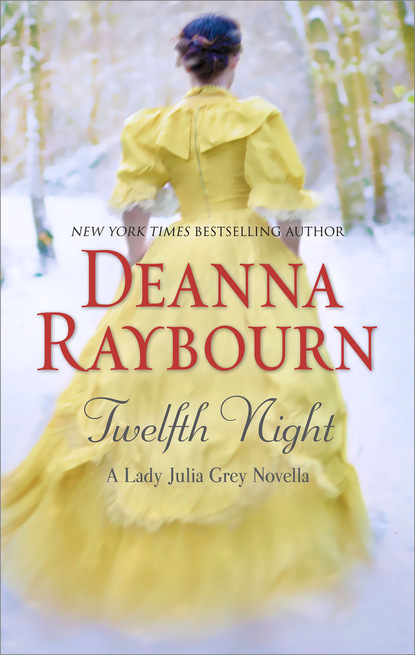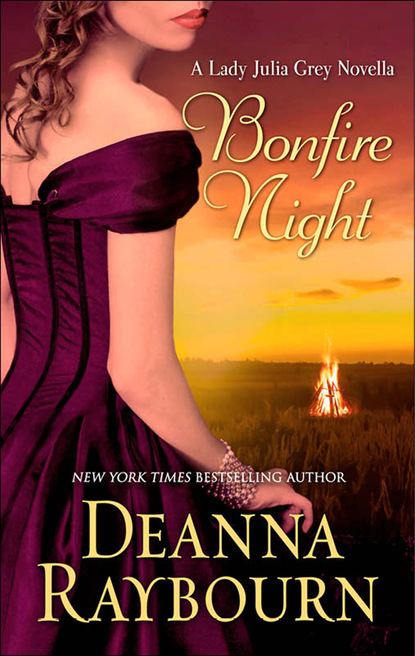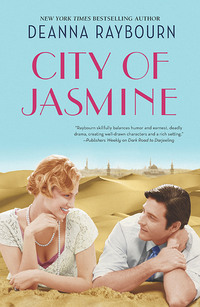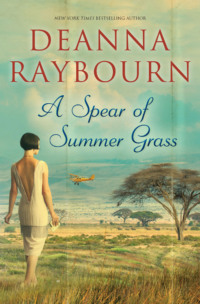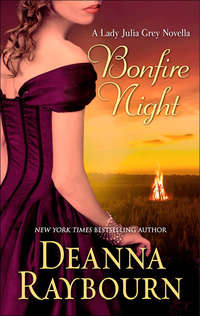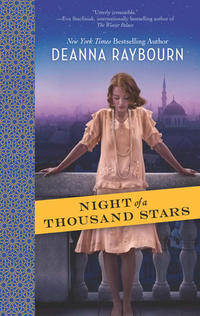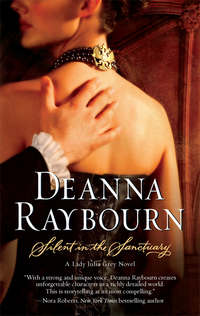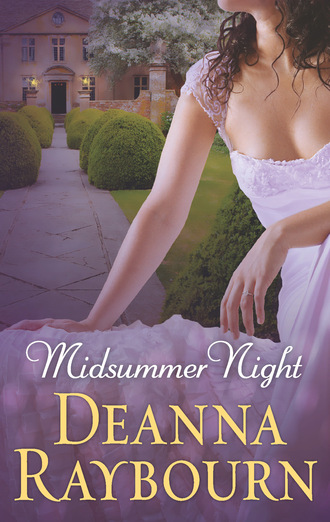
Полная версия
Midsummer Night

Readers everywhere have fallen for New York Times bestselling author Deanna Raybourn’s intrepid amateur sleuth and socialite, Lady Julia Grey. Not to mention her devastating partner in crime, Nicholas Brisbane. Midsummer Night is the long-awaited story of their wedding, a dashing—and potentially deadly—affair not to be missed....
Midsummer in England—an auspicious time for a wedding. Brisbane has taken charge of the music. Julia has, perhaps mistakenly, allowed her sisters to choose the dress. And Belmont Abbey is overflowing with guests awaiting the blessed day. What could go wrong?
Combine the close-knit chaos of village life, pagan traditions bursting through staid Victorian conventions and the congenial madness that tends to swirl around Lady Julia’s family and you get an unforgettable wedding. But add in a dangerous past nemesis who has come to wish them not-so-well, and their day to remember just might take a fatal turn....
Don’t miss a single tale in the Lady Julia Grey series—or Deanna Raybourn’s latest stand-alone novel, A Spear of Summer Grass.
Praise for the novels of Deanna Raybourn
“With a strong and unique voice, Deanna Raybourn creates unforgettable characters in a richly detailed world. This is storytelling at its most compelling.”
—Nora Roberts, #1 New York Times bestselling author
“[A] perfectly executed debut....Deft historical detailing [and] sparkling first-person narration.”
—Publishers Weekly on Silent in the Grave, starred review
“A great choice for mystery, historical fiction and/or romance readers.”
—Library Journal on Silent on the Moor
“Raybourn...delightfully evokes the language, tension and sweeping grandeur of nineteenth-century gothic novels.”
—Publishers Weekly on The Dead Travel Fast
“Raybourn expertly evokes late-nineteenth-century colonial India in this rollicking good read, distinguished by its delightful lady detective and her colorful family.”
—Booklist on Dark Road to Darjeeling
“Beyond the development of Julia’s detailed world, her boisterous family and dashing husband, this book provides a clever mystery and unique perspective on the Victorian era through the eyes of an unconventional lady.”
—Library Journal on The Dark Enquiry
Midsummer Night
Deanna Raybourn

Contents
Chapter One
Chapter Two
Chapter Three
Chapter Four
Chapter Five
Chapter Six
Chapter Seven
31 December 1889
Bellmont Abbey, Sussex
My dearest niece Ophelia,
I need not tell you how sorely you were missed at Christmas. I understand your attachment to your fiancé dictated your absence, but I hope we shall see you here at Bellmont soon. Preparations are underway for the Twelfth Night play, and the usual squabbles have ensued. Your Aunt Olivia has been prevailed upon to play the villainous Turkish Knight, and she did not take it at all well when your father said it was because of her incipient moustaches. This was a calumny on his part; your Aunt Olivia’s whiskers are barely in evidence. Of course, tact never was Bellmont’s strong suit, as you well know.
But I did not take pen in hand to abuse my brother to his daughter! (I can only plead the excuse that I was assisting your Uncle Plum in his experiments with Aunt Hermia’s punch receipt in preparation for this evening’s New Year’s Eve festivities.)
When your dear mama confided you were nervous about your impending nuptials and requested each of your aunts to write a letter of advice and encouragement, I did not hesitate to take up the challenge—although it occurs to me now I might better have waited until the bright light and sober head of New Year’s Day to undertake the task. But no matter! I know your Aunt Portia means to speak frankly in her letter about the intimacies of the marriage bed, so I will draw a veil over that part of the nuptial experience except to say that whatever she tells you must be ignored entirely. She was married to an elderly man of questionable constitution, and as she prefers the company of women, I expect her experiences might charitably be described as uninformative. In my own case—well, as I said, I shall draw a veil of modesty over the marriage bed. Just remember that it is bliss, dear girl. And if it is not, he is doing something wrong and must be corrected firmly.
Ah, I am afraid your Uncle Brisbane hazarded a peek over my shoulder at that last bit and snorted. But it is entirely true. The felicity of the marriage bed depends upon mutual satisfaction. If you find your new husband lacking in this capacity, I can offer no better advice than to tell you to refer him to your Uncle Brisbane, who is uncommonly talented at—Oh, very well! Uncle Brisbane has peeked again and has insisted with unusual firmness that I cease writing in this vein altogether. I shall say no more, but if you should find yourself in need of advice, you have only to come to me and we shall arrange a nice tête-à-tête about the matter.
I was elected to write to you on the subject of all that can go awry with the wedding. The reason for this is simple—my own wedding very nearly did not happen. I do not mean my first wedding to Sir Edward Grey, requiescat in pace. That wedding went off without a hitch save your grandfather’s pointed reluctance to walk me down the aisle. There was an unseemly moment where I had to pull him as I walked backwards, but I never thought of it as an omen. Perhaps I ought to have, considering the outcome. Syphilis, infidelity, blackmail, and murder—there is a litany of marital woes to make a celibate of any right-minded girl! (Your Aunt Portia has just looked over my correspondence and spoken quite firmly about the inappropriateness of that last line. I can only say that a person’s letters ought to be private, but privacy is a scarce commodity at Bellmont Abbey. I ought to have written this in my own room, but my raven, Grim, is gently dismembering his dinner and the sight is uninspiring. Nevertheless, I shall persevere.)
Picture if you will a perfect English June, that summer of 1888. (Is it only a year and a half? It seems the whole of my life has been held within the span of those short months. All I have known of love, of pleasure, of deepest contentment is contained within them.) Brisbane and I had been two months engaged since our sojourn in Yorkshire,1 and we had seen each other precisely once since our betrothal. You know of his work as a private enquiry agent, so it will not surprise you to find that he had embarked upon a succession of cases that took him out of London. We wrote voluminous letters, but Brisbane has always preferred a more direct and physical demonstration of his affections than the written word.
In any event, Brisbane and I were betrothed and then quickly parted. I walked in a daze during those weeks, so pure was my happiness, and was content to let my sisters plan my wedding. Some while later I wrote down the events of the wedding itself, and copying them out afresh seems beyond my abilities at the moment. I detect no effects from Uncle Plum’s experiments with the punch bowl save that my hand seems curiously unable to grip the pen properly and I can only focus my eyes with the greatest of difficulties. Your Aunt Portia has suggested a wee nap might not go amiss, and so I enclose the original document, asking only that you return it when you have finished.
I hope it proves useful, my dear. I remain always,
Your loving Aunt Jul—
P.S. Dearest Ophelia, I have removed the pen from Aunt Julia’s fingers and handed her over to Uncle Brisbane to put to bed with a hot brick and something for her head when she wakes. I see from her letter she meant to send you the short manuscript she wrote some months ago, describing the events of her wedding to Brisbane. I hesitate to send it for fear it will put you off the idea of marriage entirely, but perhaps if one is prepared for the worst, all other travails will seem mild in comparison.
Your devoted aunt,
Portia
Chapter One
He is the half part of a blessed man,
Left to be finished by such as she,
And she a fair divided excellence,
Whose fullness of perfection lies in him.
—King John, II.I.437
“For God’s sake, Julia,” grumbled Portia. “It’s your wedding. Do you not even care to choose the flowers?”
“Pray, do not ask her,” our elder sister, Olivia, put in firmly. “Her opinion will only confuse the matter. Tell her what she likes—that is the way to deal with Julia. And what she will like is flowers sent down from London,” she finished, ticking an item off her enormous list of wedding notes.
“You are sending to London for flowers?” Portia’s voice was incredulous. “Flowers come from the country.”
“Not these flowers,” Olivia corrected. “Hothouse orchids. Just the thing.”
“I thought wildflowers might be best—things one might cut from the garden. It is a country wedding,” I pointed out.
“You will look like a peasant,” Olivia warned.
Portia countered with something cutting and I left my sisters quarrelling over the details whilst I mooned about, waiting for a letter from Brisbane. While Olivia had wanted a smart town wedding, the rest had mercifully overruled her and decided I would be married from the church of St. Barnabas in Blessingstoke, the village nestled at the foot of our family seat at Bellmont Abbey, surrounded by friends and family. As it was not thought seemly we sleep under the same roof before the wedding, it was arranged that Brisbane would lodge with Uncle Fly at his vicarage in preparation for the day. Brisbane’s response to this was eloquent and profane, but he agreed in the end, stipulating that he would only submit if he were permitted to take the music entirely in hand. Olivia gave in with singularly bad grace, but Brisbane’s taste was impeccable, and I was delighted he intended to take so active a role in the wedding itself. He began a frequent correspondence with Mrs. Netley, the blacksmith’s wife and organist of the church of St. Barnabas, a position she guarded jealously.
With all the necessary arrangements made, two days before Midsummer we assembled at Bellmont Abbey. Family flocked from the four corners of Britain, a collection of relatives so numerous the Abbey was fairly bursting at the seams to contain them. Aunt Hermia, in her capacity as official hostess of the Abbey, had hired in a number of girls from the village to help with food preparations and the endless round of bed making, dusting and sweeping so many guests demanded.
The last expected guest had just arrived in a flurry of embraces when there came a great rapping at the vast door of the Abbey. Hoots, as much a fixture in the Abbey as any of the furniture and approximately twice as old, hurried to open it, but not hastily enough, and I heard a booming voice carrying into the hall.
“My God, man, leave me rot on the doorstep, and me come all the way from Scotland! Get out the way and let me pass before I poke you with my stick, you great nubbin.”
I turned to Aunt Hermia in shock. She mouthed a single word at me. “Aberdour.”
It was his Grace, the Duke of Aberdour, Brisbane’s great-uncle and the genteel terror of the United Kingdom. I gave Aunt Hermia a meaningful glance. “Warn the maids,” I told her as I hurried forward.
“Your Grace, how delightful to see you! You sent regrets,” I said, moving to him with my hand extended.
He ignored it and kissed me soundly on the mouth. “Of course I sent regrets. It would hardly be a surprise if I told you I was coming.” He smacked his lips appreciatively as he looked me up and down. “You’ve put on a mite of weight since I saw you last. Looks like it all went up top,” he noted, leering into my décolletage. He leaned closer. “Tasty enough, but I am rather a bum man, myself.”
“Indeed, your Grace?” I asked faintly.
He gave a wheezy chuckle. “Don’t look so abashed, lass. I am too old to mend my ways. Now, tell me the truth. Do you really mean to marry that scapegrace nephew of mine or have you reconsidered my proposal?”
“Your proposal?”
He huffed, offended. “When last we met at your father’s house in London—that musical evening of Lady Hermia’s—I seem to recall offering you my hand. What about it, girl? You’d be a duchess. That is nought to sneeze at. And I wager I could give my nephew a run for his money in the bedchamber. He hasn’t as much practise as I have. You see, the key to bedding a woman—”
I broke in swiftly. “How kind of you to renew your offer, your Grace. But I am afraid I must decline. Brisbane is the man for me.”
He gave me a shrewd look from under his bushy white brows. “You are a woman besotted. I can see it well enough. And he is just the same. We came down on the same train and he went quite moony at the mention of your name, poor cub. Very well, then. If you will not marry me, point me towards the port. I’ve had the devil’s own trip of it and could use a bit of stimulation.”
He waggled his eyebrows at me, but before I could respond, Portia moved smoothly forward. “I will be happy to show you to the drinks cabinet,” she said, putting an arm through his. “And we can have a nice chat. I believe you were saying something instructive on the bedding of women?”
Portia drew him away and Aunt Hermia and I exchanged horrified glances.”Wherever shall I put him? All the guest rooms are taken.”
“You could let him sleep in your room,” I told her mischievously. “He seems to be in the market for a wife.”
She nipped me hard with her fingers but I twisted away and slipped out the door just before Hoots swung it closed on its massive hinges. The problem of what to do with the duke did not fall to me, and I had more pressing matters to attend to. Brisbane had arrived! I had not seen him for nearly two months, and I was not prepared to wait a minute more. I fairly flew down the long drive, heedless of the stones cutting through my thin slippers. I had intended to walk to the village, but no sooner had I passed through the gates of the Abbey than I spied him crossing a field of young wheat, his hand brushing the top of the budding ears. I stopped, my heart rushing so quickly I thought it would fly right out of my chest. I opened my mouth, and found I could not speak. I could only stare at this magnificent figure of a man—a man who loved me just as I was, for all my foibles and faults, and I nearly choked with gratitude. There was something holy in that moment, and this is not a word I use lightly. I do not look for God within stone walls or listen for him in spoken scripture. But in that moment, some divine kindness settled over us, and it was that moment that I felt truly married to him.
I stepped forward and opened my mouth again, but before I could call his name he jerked his head up, looking straight at me. I do not know if it was his second sight that told him I was there—the legacy of his Gypsy mother—but he looked at me and I saw him catch his breath before a smile stole over his face and he broke into a run.
He caught me hard against him and the kiss we shared would have shamed the devil. When we spoke it was quickly, words tumbling over each other as we clung together.
“I missed you,” I told him, and one ebony brow quirked up in response.
“Really? I did not notice,” he said, casually removing my hand from inside his shirt.
“I do not much care for your gadding about without me,” I told him. “I didn’t even know where you were.”
“Paris,” he said promptly. “Wrapping up a counterfeiting case.”
“To your satisfaction?”
“Entirely, although it is not half as satisfying as this,” he added, applying himself to a demonstration of his affections.
We broke apart, breathless and disheveled after a moment. “God, I have missed you,” he said, his voice rough in my ear.
I kept my arms about his neck, stretching myself gently on tiptoe. “After Midsummer Day, you needn’t miss me ever again. I can go with you wherever your work takes you.”
His expression darkened a little, but he did not allow his smile to falter. Whatever his intentions for our marriage, it was apparent he would have to adjust them, I decided.
He changed the subject smoothly.
“Speaking of my work, I had a look in on the unfortunate author of last winter’s crime,” he said, nodding almost unconsciously towards the Abbey. Our Christmas visit had been fouled by a gruesome murder, and Brisbane had been responsible for removing the villain to official custody.2
“How is he?” I asked. I had spent time alone with the fellow, and while he was a murderer, to be sure, as killers went, I found him rather kindly.
“Mad as the proverbial hatter,” he told me. “He has been sent to Broadmoor. I would not expect to hear of him again.”
“Rather sad, really,” I mused aloud. Brisbane’s expression was frankly astonished.
“Julia, he was a murderer. You cannot come over all sympathetic to people who take other people’s lives. There must be justice in the world.”
“He only did so at another’s instigation,” I argued, but before I could work up a full head of steam, he silenced me with another demonstration of his feelings.
“You will not always be able to quiet me with a kiss,” I warned him.
“Oh, I have much more thorough ways of stilling your tongue,” he promised, his black eyes gleaming.
I swallowed hard. “Really, Brisbane, that isn’t at all what I meant.”
He grinned. “I know exactly what you meant. You intend to bedevil me until you are a full partner in my work. And I will never let that happen, so let us understand one another entirely from the beginning.”
Before I could rouse a protest, he silenced me, this time with a finger laid over my lips. “I know what you want of me, Julia. Believe me when I tell you I will always struggle to give you that. My work is dangerous, more so than I have ever permitted you to know. And the whole of my life must be devoted to protecting you. You are too precious to me to allow any peril to come to you.”
I looked briefly away. “If you keep talking like that, I shall entirely lose my will and next thing I know, I will be darning your socks as you gallivant about the Continent, apprehending murderers and jewel thieves.”
He pressed a quick kiss to my brow. “Speaking of jewel thieves, you will be interested to know Charlotte King is abroad. She has been released for lack of proof.”
Charlotte King was a name I had not thought to hear again. A jewel thief of graceful, golden beauty and some renown, she had been brought to justice by Brisbane the previous winter, although not without incident. I had nearly cost him the apprehension with my impulsive actions, and I did not look upon the incident with any fondness.
Brisbane went on. “And I have had a letter from Miss Allenby. She has begun teaching her first term and finds she is entirely happy in her new life. She sends her regards and congratulations on our marriage.”
This was news I could appreciate with no regrets. Miss Allenby had become something of an ally during our last investigation, and I was pleased she had settled so swiftly into a new life, putting murder and mayhem behind her.
“We shall have to send her a piece of the wedding cake,” I told him. “She can sleep with it under her pillow and dream of the man she will wed.”
“Speaking of prospective husbands,” Brisbane murmured, “this one can think of something better to do than talk about old cases.”
“Show me,” I commanded.
He did, and in the middle of a highly instructive interlude, he broke off, lifting his head with a smothered oath.
“What?” I demanded. “What on earth could drag your attention away from caressing my—” I broke off.
“As diverting as this is,” Brisbane said, pressing a kiss to my palm, “I believe that is the vicar.” He nodded over my shoulder and I turned to find Uncle Fly wheezing towards us, his colour high and his long white hair dancing madly in the breeze.
“Here now! We’ll have none of that,” he called, wagging a finger in mock severity as he panted up.
“Uncle Fly, are you quite well? You look ready for an apoplexy,” I said, flapping a handkerchief in front of his face.
He pressed one hand to his side and waved me off with the other. “Nothing wrong with me except too heavy a midday meal. Cook never will learn that pork is too rich for luncheon.” He took my handkerchief and mopped his brow. “That’s better, that is. Now, let’s have no more fornicating in the hedgerows, shall we? Sets a bad example.”
“Considering the fact that only you and one rather bored cow witnessed the exchange, I hardly think we are in danger of corrupting the morals of the Blessingstoke peasantry,” I returned tartly.
But although Uncle Fly’s expression was stern, his eyes were twinkling. “What about corrupting me? I am entirely too old to suffer many more such shocks.” He turned to Brisbane. “Come along, lad. My housekeeper has made up your room and you will see Julia soon enough.”“Of course, vicar,” Brisbane replied blandly, following Uncle Fly without so much as a backward glance at me, much less a kiss goodbye. I stalked off, annoyed with the pair of them. Brisbane was forty, and I was a decade younger, and yet Uncle Fly had treated us as if we were no better than children. And Brisbane had complied so easily!
I stamped down the road, taking my irritation out on a handful of wildflowers I plucked from the wayside. There were foxgloves and poppies and mignonettes in flower, a riot of colour in my hands. I picked the petals from the ox-eye daisies, scattering them behind me like so much confetti as I climbed over a stile. I crossed the river meadow until I came to the edge of the stream itself and removed my slippers. I pulled off my stockings and dabbled my toes in the water, disturbing a damselfly in a flutter of iridescent wings. The rush of cool green river was glorious against my heated skin, and I paddled my feet back and forth, scattering the rest of the petals to the wind.
“If you’re looking to tell if a man loves you, you’ve made a pig’s breakfast of it,” said a voice at my elbow.
I jumped, scattering the stems from my lap as I half turned. A Gypsy woman stood there, arms folded under her breasts as she regarded me coolly. She wore the usual layers of ruffled skirts in spite of the heat, and a scarf of flowered scarlet had been tied around her head. She followed the Gypsy custom of wearing one’s wealth, for her neck and arms were heavy with coins dangling from chains and bangles, and I wondered how I had not heard her approach.
“A Romany woman is as quiet as she wants to be,” she told me before I asked. She nodded sharply to the torn flowers in my hands. “You want your fortune told? I can do better than flowers.”
I thought of my previous experiences with tasseomancy and Tarot cards and suppressed a shudder. “Thank you, no. I’m afraid I have no silver with which to cross your palm.”
She shrugged. “No matter. I will tell yours for free.” Before I could speak, she knelt and took my hand in hers. Her palms were warm and her flesh exuded an earthy smell like newly tilled soil or coming rain.
She stroked my palm gently, following the lines from fingers to wrist, muttering under her breath. She shook her head, her expression mournful, and her voice took on a keening quality.
“Oh, lady, I see unhappiness here! Such woe and trouble comes to you. Shadows lie in wait for you, the shadows of things that will come to pass if you do not change your course.”
“How frightful!” I murmured.
She gave me a sharp look. “You do not believe.”
I bared my teeth in a smile. “I’ve heard these things before.”




